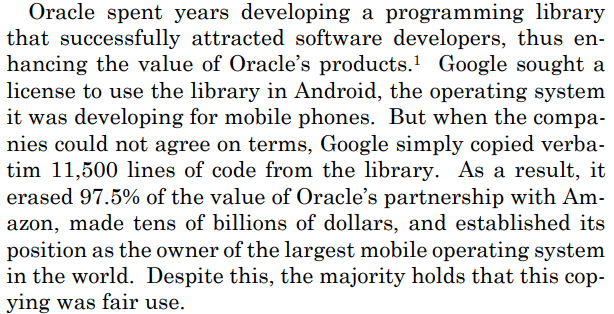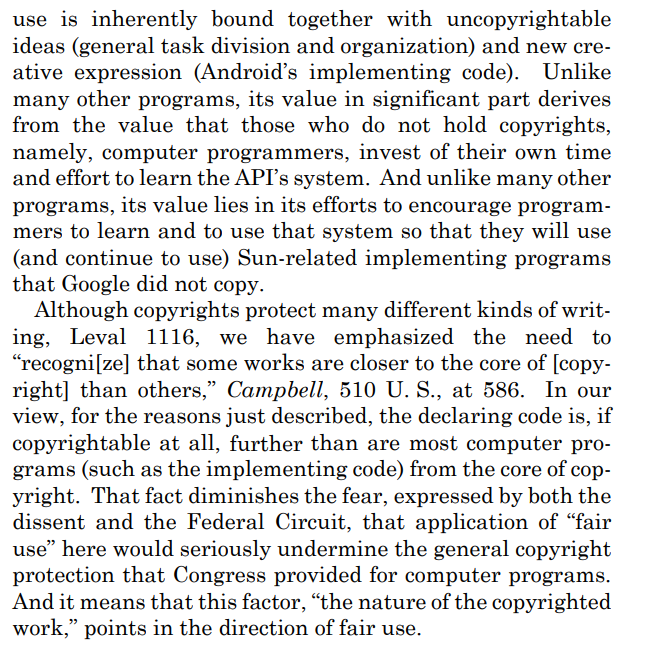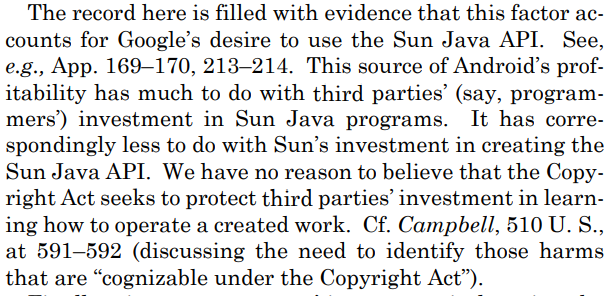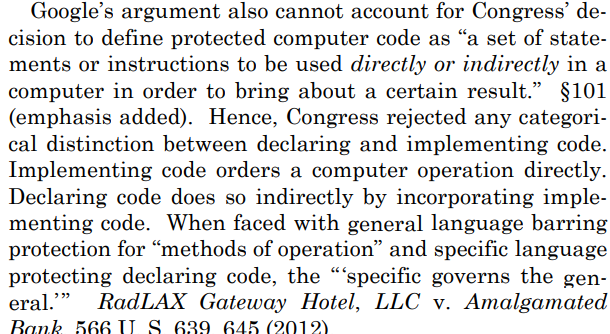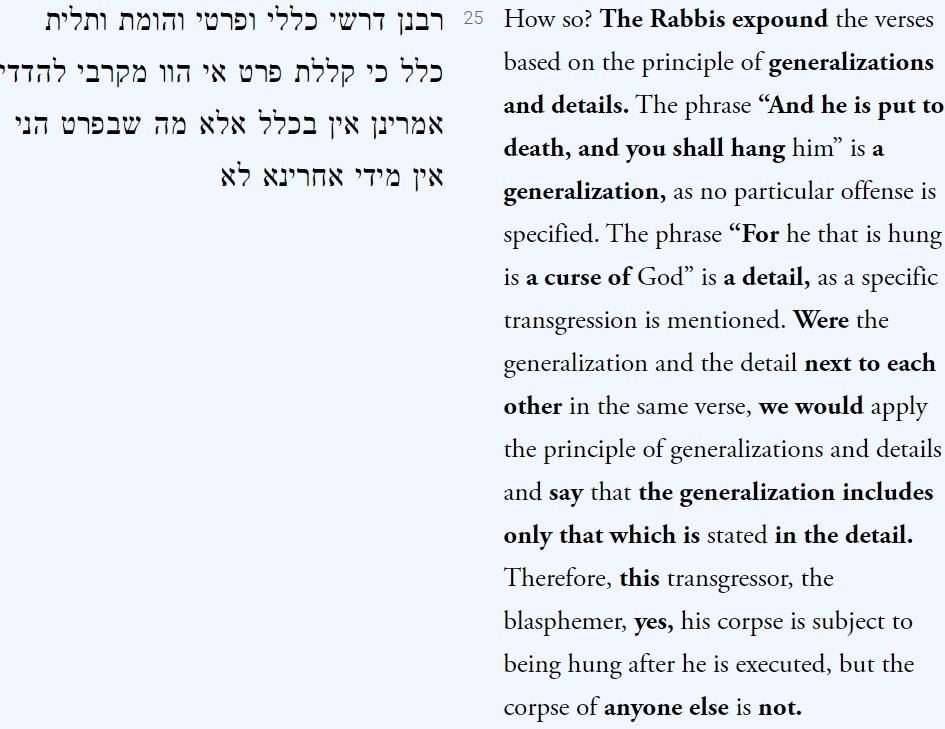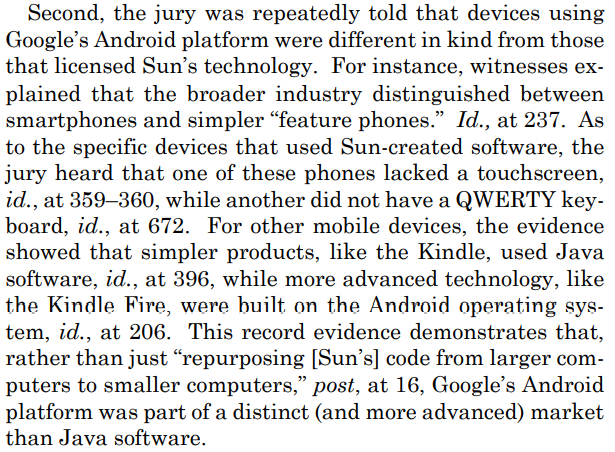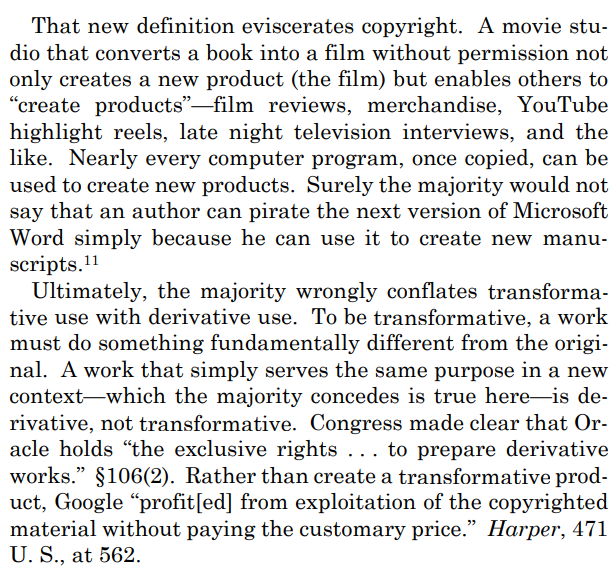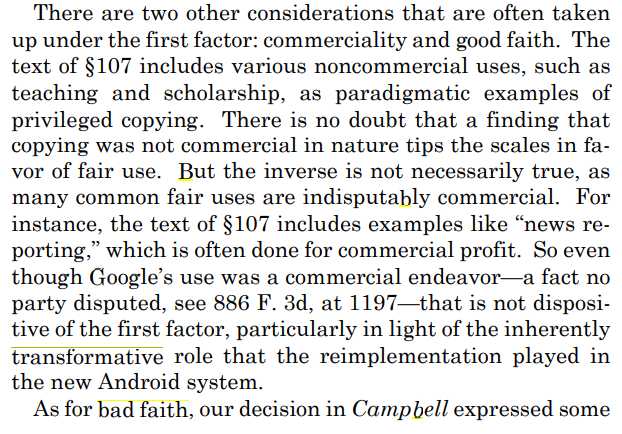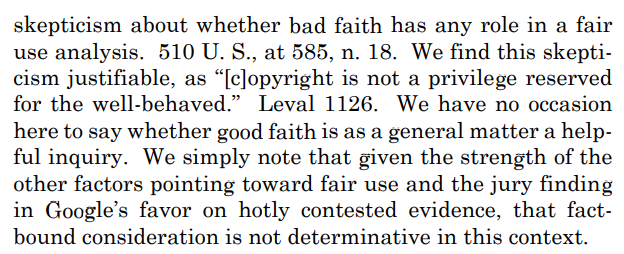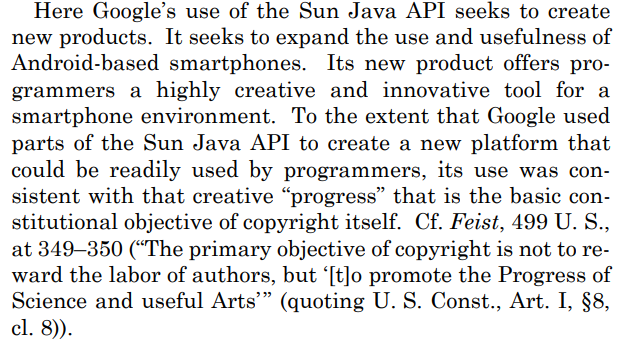#SCOTUS is frequently in habit of employing sloppy motivated reasoning & tortured logic to manufacture outcomes they believe to be just
In @Oracle / @Google decision they employed sloppy motivated reasoning & tortured logic to manufacture a manifestly unjust outcome (thred ->)
In @Oracle / @Google decision they employed sloppy motivated reasoning & tortured logic to manufacture a manifestly unjust outcome (thred ->)
Thomas& #39; dissent is worth reading in full but to add a few notes
1. The beating heart of Breyer& #39;s opinion, the contrast bet. Interfaces ("declaring code") & Implementations is a Distinction w/o a Difference (or as we used to say in Yeshiva, a Chiluk that isn& #39;t M& #39;Chalek)
1. The beating heart of Breyer& #39;s opinion, the contrast bet. Interfaces ("declaring code") & Implementations is a Distinction w/o a Difference (or as we used to say in Yeshiva, a Chiluk that isn& #39;t M& #39;Chalek)
2. Breyer& #39;s claim repeated here is illustrative. Despite his suggestion, there is nothing novel / exotic going on here: Someone trying to wrongfully profit off of familiarity a creator has developed w/ her consumers is the most ordinary sort of copyright infringement imaginable
3. A surprisingly precise analogy might be if #SCOTUS ruled that inking comic books is "further from the core of copyright" than Coloring & so its "fair use" for someone to wholesale copy the inking version of a Marvel Comic Book & sell a competing version w/ different Coloring
4. Breyer is wrong that this doesn& #39;t gut software copyright generally. The success of large scale software is far more tied to its interfaces than implementations
Analogy: If u have a bad bulb (implementation), you can replace it, if ur home wiring (interface) is faulty tho...
Analogy: If u have a bad bulb (implementation), you can replace it, if ur home wiring (interface) is faulty tho...
5. As proof, does anyone really think @Google (or @GoldmanSachs) wouldn& #39;t cry bloody murder if someone used the interfaces underneath any of their flagship products to deliver a competing product to market?
(in GS& #39;s case, think *trading systems*: you& #39;d go to JAIL for doing that)
(in GS& #39;s case, think *trading systems*: you& #39;d go to JAIL for doing that)
7. Another bit of tortured logic is claim Google didn& #39;t harm bc Java wasn& #39;t well suited for smartphones, tho Breyer can& #39;t quite settle on whether that was bc Java was only suited to more complex (desktops) or only simpler (feature phones) environments - it was successful in both
8. Worth Highlighting Thomas& #39; evisceration of Breyer& #39;s claim Google& #39;s Android was "transformative"
"911 operator, i& #39;d like to report a murder...
"911 operator, i& #39;d like to report a murder...
9. Breyer& #39;s "Good Faith" analysis is also telling. A common sense marker of fair use is whether there was intention to subvert the copyright. eg a news reporter is not likely trying to do so, Google otoh unquestionably was. So Breyer chooses to discount common sense
10. To make the most sense I can of Breyer:
Best I (non-lawyer) can make of it, Court seems to implicitly give "fair use" two distinct meanings
a) what we ordinarily understand by "fair use" eg a parody or academic study &
b) any use the court deems to be in public interest
Best I (non-lawyer) can make of it, Court seems to implicitly give "fair use" two distinct meanings
a) what we ordinarily understand by "fair use" eg a parody or academic study &
b) any use the court deems to be in public interest
11. The prime example of b, seems to be this Sega case where a court decided it was in the public interest to allow game developers to reverse engineer their way into proprietary platforms https://en.wikipedia.org/wiki/Sega_v._Accolade">https://en.wikipedia.org/wiki/Sega...
12. This seems to be somewhat unstated. Court nominally has a multi-factorial analysis to go through in assessing fair use (altho it insists its not deterministic & it has wide leeway in what conclusions it draws). We& #39;ve shown that Breyer wasn& #39;t overly concerned w/ rigor there
13. The only way I can make sense of Breyer& #39;s opinion is he& #39;s basically (very subjectively) arguing the public interest was served by Google& #39;s piracy & so the Court is blessing it
The obvious danger inherent in this doctrine is likely why he doesn& #39;t dare declare it explicitly.
The obvious danger inherent in this doctrine is likely why he doesn& #39;t dare declare it explicitly.
14. In the end, the only silver lining here may be the degree to which this decision lays the facts in front of us very plainly
If the #SCOTUS blesses an Oligarch Corporation& #39;s Highway Robbery of a somewhat smaller corporation, what chance for justice do any of us normies have?
If the #SCOTUS blesses an Oligarch Corporation& #39;s Highway Robbery of a somewhat smaller corporation, what chance for justice do any of us normies have?
Appendix A
Please see this thread for clarification regarding my argument #2 https://twitter.com/WhippleMarc/status/1381596725715034115?s=20">https://twitter.com/WhippleMa...
Please see this thread for clarification regarding my argument #2 https://twitter.com/WhippleMarc/status/1381596725715034115?s=20">https://twitter.com/WhippleMa...

 Read on Twitter
Read on Twitter